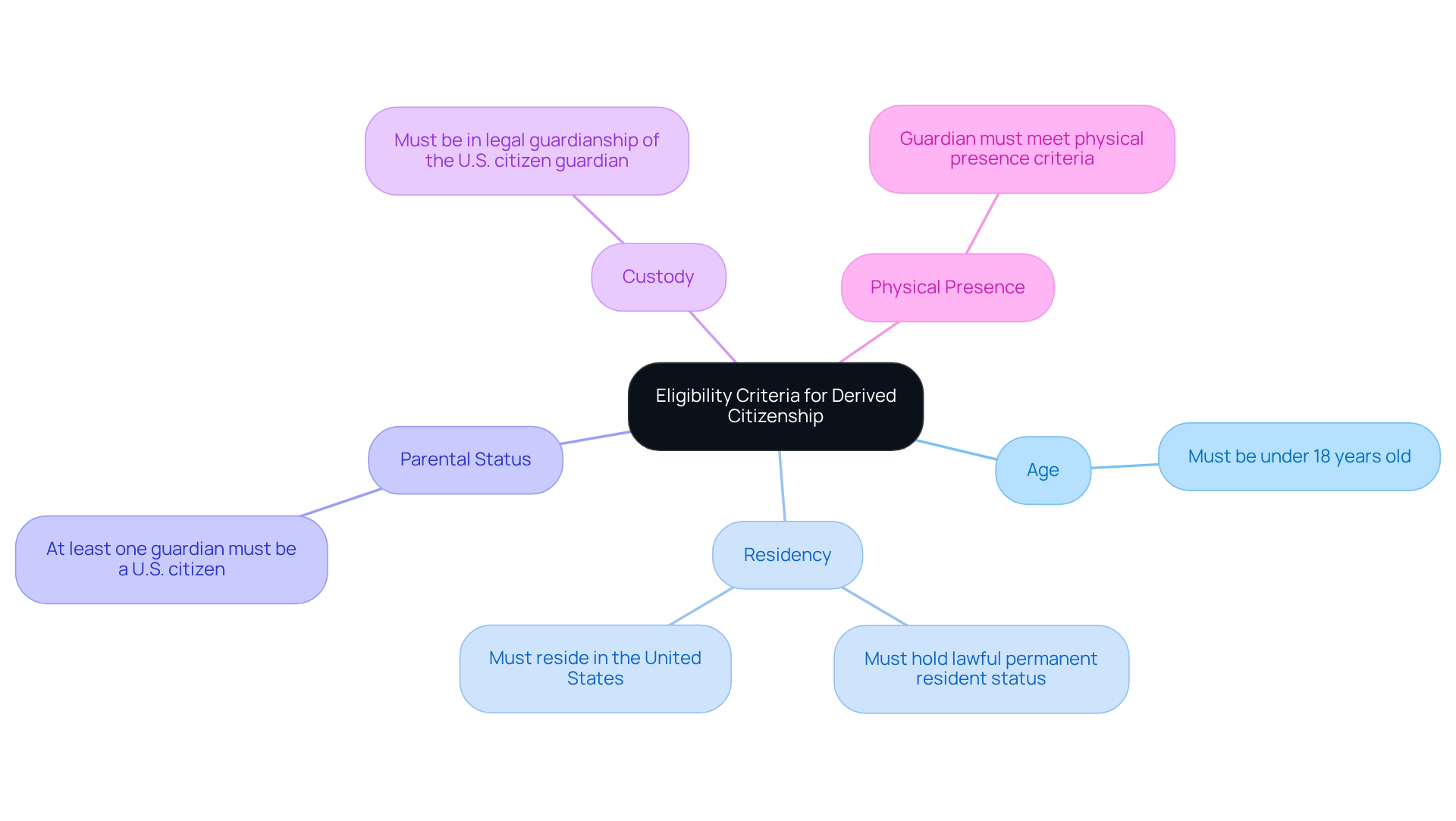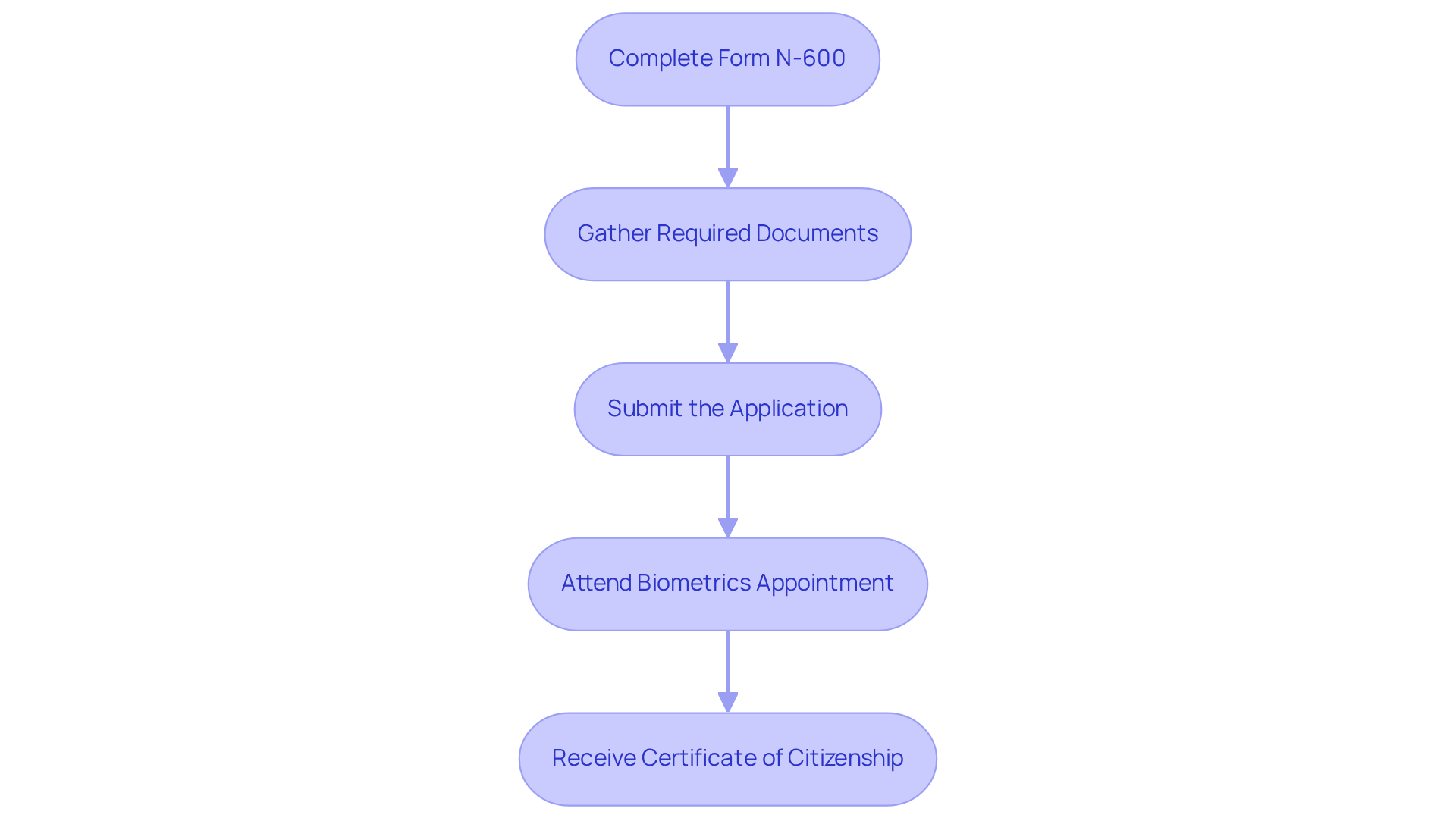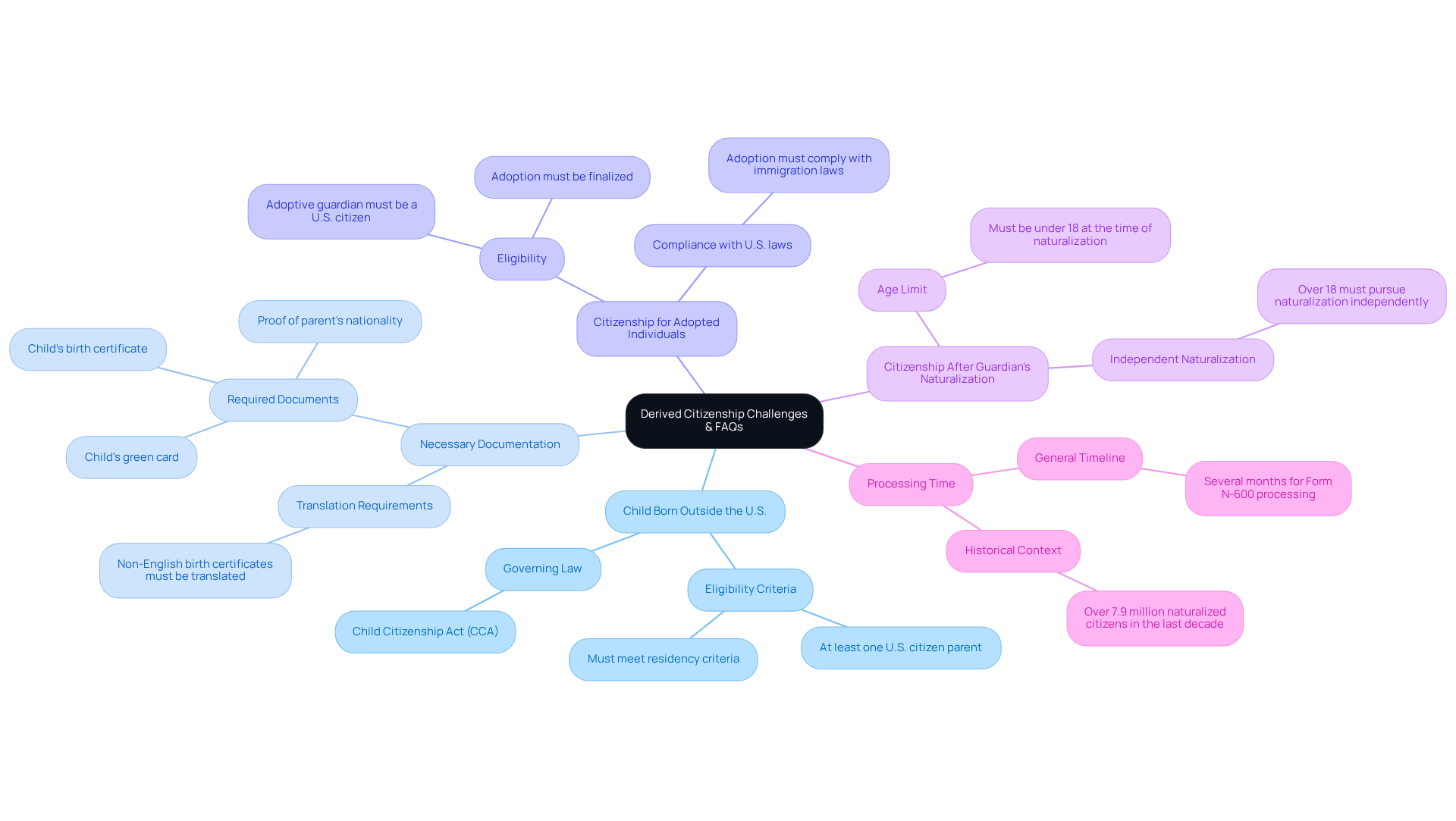Overview
Derived citizenship is a vital lifeline for minors, allowing them to automatically gain U.S. nationality when their guardian(s) become naturalized citizens. But what does this mean for families navigating the complex immigration landscape? It’s crucial to understand the specific criteria involved—like age, residency, and parental status—that determine eligibility.
The Child Citizenship Act outlines these requirements and the application process, ensuring that families can stay united. This provision is not just a legal detail; it plays a significant role in family integration, impacting countless youth who benefit from it.
We understand how overwhelming this feels. But you don’t have to face it alone—we’re here to guide you every step of the way. Your family’s future matters to us, and we’re committed to fighting for your rights.
Introduction
Derived citizenship is a crucial lifeline for minors in immigrant families, automatically granting them American nationality when their guardians become naturalized citizens. This process, established by the Child Citizenship Act of 2000, not only streamlines the path to citizenship for children but also strengthens family unity amid the often confusing landscape of immigration law. Yet, navigating the eligibility criteria and application process can feel overwhelming. Families may wonder:
- What challenges do they face in securing derived citizenship?
- How can they ensure their children are protected under American law?
We understand how daunting this journey can be. The complexities of immigration processes can leave families feeling lost and uncertain. But you don’t have to face this alone. We’re here to guide you every step of the way, ensuring your family’s rights are upheld. Let’s explore the solutions together and empower you to take action.
Define Derived Citizenship and Its Legal Basis
Derived citizenship is a crucial concept for families navigating the complexities of immigration. It allows minors to automatically obtain American nationality when their guardian(s) become naturalized citizens. Governed by the Child Citizenship Act of 2000 (CCA) and earlier laws like the Immigration and Nationality Act (INA), this process is designed to simplify nationality acquisition for young individuals. If at least one parent is a U.S. citizen and the child meets specific residency and age requirements, they can gain nationality without a separate application. This sets it apart from naturalization, which involves a formal application and interview.
Since the CCA was enacted, over 120,000 young people have benefited from derived citizenship, highlighting its role in family integration. For example, children of American citizens automatically gain nationality if they are under 18 when their parent naturalizes and live in the U.S. with that parent. However, it’s important to understand that international adoptees don’t acquire American nationality through birthright; they must go through legal immigration processes, specifically the CCA.
Experts emphasize the importance of understanding these provisions. Ryan Hanlon, a recognized authority in the field, points out that "the best proof of U.S. nationality is the Certificate of Citizenship." This underscores the efficiency of the CCA in facilitating derived citizenship for young individuals in adoptive situations. Families should be aware that if there are concerns about a minor's immigration status, consulting a knowledgeable adoption or immigration lawyer is a wise step.
Recent updates show that the CCA is evolving to address gaps and ensure that those who gain nationality are recognized and protected under American law. As immigration and nationality landscapes change, staying informed is vital for families managing the complexities of legal status for their children. With over 120,000 youths in the U.S. foster care system awaiting permanent families, understanding these legal processes is more important than ever.
We’re here to fight for your family. Your future matters to us. Yo Peleo — We Fight.

Identify Eligibility Criteria for Derived Citizenship
To qualify for derived citizenship, several criteria must be satisfied:
- Age: The minor must be under 18 years old when the guardian(s) naturalize.
- Residency: The individual must hold lawful permanent resident status (green card holder) and reside in the United States.
- Parental Status: At least one guardian must be a citizen of the United States, either by birth or through naturalization.
- Custody: The minor must be in the legal guardianship of the American citizen guardian.
- Physical Presence: The American citizen guardian must have fulfilled the physical presence criteria in the United States before the offspring's birth or before the offspring reaches 18, as outlined by the Child Citizenship Act (CCA).
It’s crucial to understand that derived status can be revoked under rare circumstances, such as fraudulent acquisition of nationality. Recent cases show that youngsters who meet these requirements automatically obtain American nationality via derived citizenship following their parent's naturalization. For instance, the Lee family's children became citizens when their father naturalized, as they were all under 18 at that time.
Moreover, many youth with derived citizenship come from immigrant families, showcasing the diverse backgrounds of new American citizens. Understanding these requirements is vital for families navigating the immigration process, ensuring that eligible children can secure their legal status effectively.
Additionally, obtaining a Certificate of Citizenship using Form N-600 is a critical step in the process, serving as official evidence of national status. Remember, you’re not alone in this journey—we’re here to fight for your family.

Outline the Application Process for Derived Citizenship
Getting official proof of your nationality is crucial, even if it happens automatically. Here’s a clear process to follow:
- Complete Form N-600: This application for a Certificate of Citizenship can be submitted online or on paper. Make sure to fill it out correctly to avoid delays—incorrect filings can lead to rejections.
- Gather Required Documents: You’ll need your child’s birth certificate, proof of your U.S. nationality (like a naturalization certificate), and evidence of your child’s lawful permanent resident status. Accurate documentation is key for a successful application.
- Submit the Application: Send the completed Form N-600 along with the necessary documents to the designated USCIS address. Don’t forget to include the filing fee of $199, plus any other applicable USCIS fees.
- Attend Biometrics Appointment: If needed, your child may have to attend a biometrics appointment for fingerprinting, which is a standard part of the process.
- Receive Certificate of Citizenship: Once approved, USCIS will issue a Certificate of Naturalization, which serves as official proof of nationality. This certificate is essential for many legal reasons, including applying for an American passport.
Most N-600 applications are processed within 4 to 6 months, as long as they’re filed correctly. However, be aware that USCIS has rejected some applications for various reasons, so careful preparation is vital. Meeting all requirements can significantly boost your chances of success. After you file, you’ll typically receive a receipt notice confirming your Form N-600 was received within 2 to 4 weeks.

Address Common Challenges and FAQs in Derived Citizenship
Common challenges and FAQs regarding derived citizenship include:
-
What if the young one was born outside the United States? A minor born beyond our borders can still obtain nationality if at least one guardian is an American. They must meet residency criteria, like living in the U.S. as a lawful permanent resident. This process is governed by the Child Citizenship Act (CCA), which outlines how minors can automatically gain derived citizenship in the United States.
-
What documentation is needed? Vital documents include the child’s birth certificate, proof of the parent’s nationality (like a birth certificate or naturalization certificate), and the child’s green card. If the birth certificate isn’t in English, a translated copy must be provided. Additionally, a certified copy of the foreign birth certificate is usually required for biological children of American citizens.
-
Can adopted individuals obtain nationality? Yes, adopted individuals can gain citizenship if the adoption is finalized and the adoptive guardian is a U.S. citizen. The adoption must comply with U.S. immigration laws, and the minor must be in the legal and physical custody of the U.S. citizen guardian.
-
What if the guardian became a citizen after the child turned 18? In this case, the young person wouldn’t qualify for derived nationality and would need to pursue naturalization independently. Children who are 18 or older at the time of their parent's naturalization cannot automatically acquire nationality.
-
How long does the process take? Processing times can vary, but applicants can generally expect several months for USCIS to process Form N-600, which is crucial for recording a child's derivative status. Over the last decade, USCIS has welcomed more than 7.9 million naturalized citizens, highlighting the significance of understanding derived citizenship in the context of family immigration.

Conclusion
Derived citizenship is a crucial pathway for minors to secure American nationality when their guardian(s) naturalize. This legal concept, rooted in the Child Citizenship Act of 2000, simplifies the process for young individuals, allowing them to gain nationality without the hassle of a separate application. For families navigating immigration, understanding derived citizenship is essential; it promotes family unity and integration.
Key points throughout this article emphasize the eligibility criteria for derived citizenship, including:
- Age
- Residency
- Parental status
- Custody
- Physical presence
The detailed application process, with necessary documentation and steps to obtain a Certificate of Citizenship, highlights the importance of careful preparation to avoid potential pitfalls. Addressing common challenges and frequently asked questions sheds light on the nuances of derived citizenship, ensuring families are well-informed.
Recognizing the significance of derived citizenship is vital for families, especially those with children in the foster care system or those navigating the complexities of adoption. By understanding the eligibility requirements and the application process, families can better advocate for their children's rights and secure their legal status. The journey toward citizenship isn’t just a legal matter; it’s a step toward a brighter future for families seeking stability and belonging in the United States.
Remember, you’re not alone in this fight. We’re here to support you every step of the way. Your family’s future matters to us.
Frequently Asked Questions
What is derived citizenship?
Derived citizenship is a legal concept that allows minors to automatically obtain American nationality when their guardian(s) become naturalized citizens, simplifying the nationality acquisition process for young individuals.
What laws govern derived citizenship?
Derived citizenship is governed by the Child Citizenship Act of 2000 (CCA) and earlier laws such as the Immigration and Nationality Act (INA).
Who qualifies for derived citizenship?
A child qualifies for derived citizenship if at least one parent is a U.S. citizen and the child meets specific residency and age requirements, allowing them to gain nationality without a separate application.
How does derived citizenship differ from naturalization?
Derived citizenship allows minors to obtain nationality automatically, whereas naturalization involves a formal application process and interview.
How many young people have benefited from derived citizenship since the CCA was enacted?
Since the enactment of the CCA, over 120,000 young people have benefited from derived citizenship.
Do international adoptees automatically acquire American nationality through derived citizenship?
No, international adoptees do not acquire American nationality through birthright; they must go through legal immigration processes, specifically the CCA.
What is the best proof of U.S. nationality for children?
The best proof of U.S. nationality for children is the Certificate of Citizenship.
Why is it important for families to understand derived citizenship provisions?
Understanding derived citizenship provisions is crucial for families, especially those with concerns about a minor's immigration status, as it helps navigate the complexities of legal status and ensures proper recognition and protection under American law.
What recent developments are occurring with the CCA?
Recent updates show that the CCA is evolving to address gaps and ensure that those who gain nationality are recognized and protected under American law.
Why is understanding legal processes important for families in the foster care system?
With over 120,000 youths in the U.S. foster care system awaiting permanent families, understanding legal processes related to derived citizenship and nationality is vital for managing their legal status effectively.




